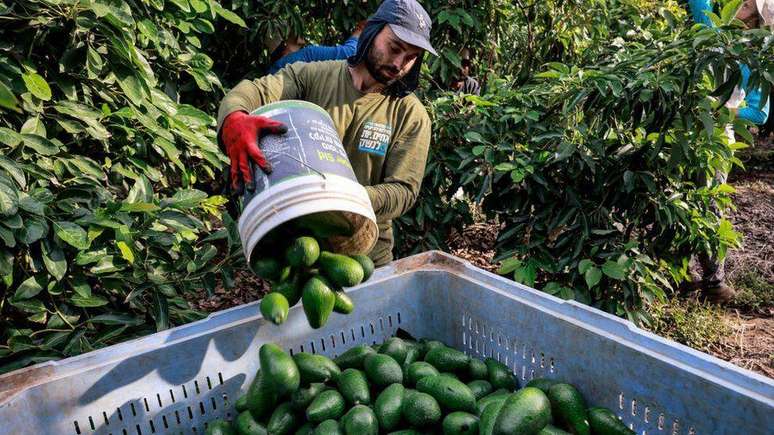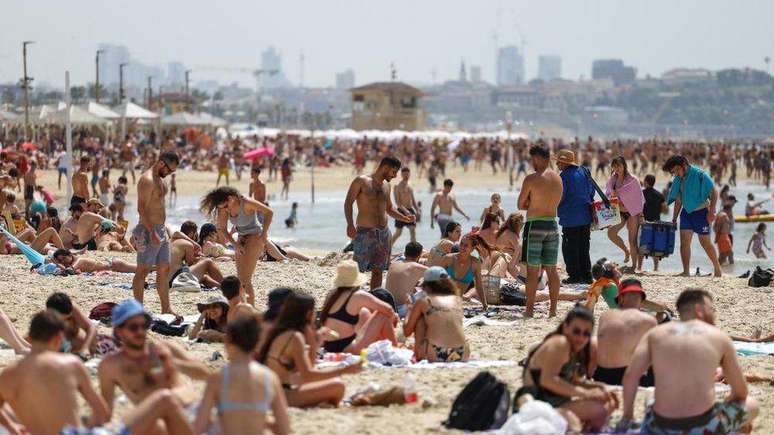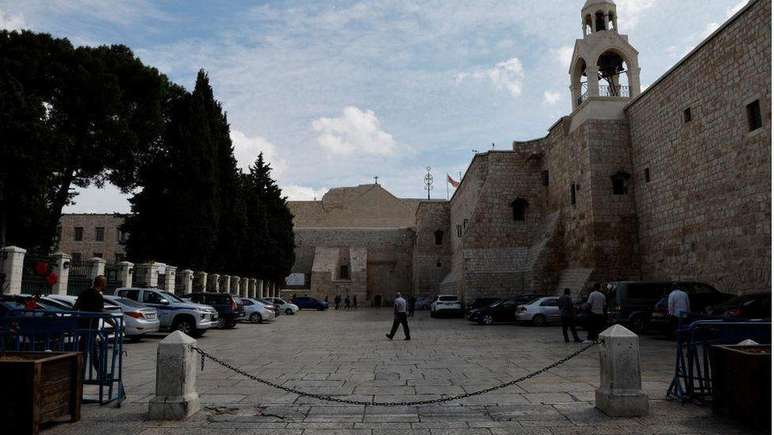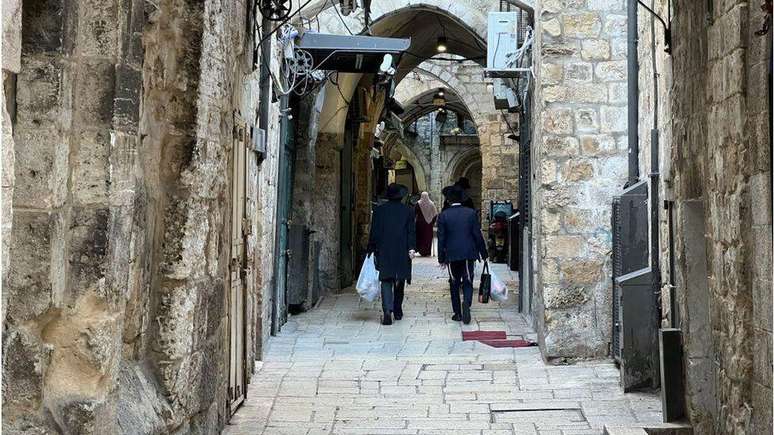Unlike in some parts of Israel, where there is optimism about its ability to weather the storm and continue to attract investors, in the West Bank and Gaza there is little hope that things will return to normal.
More than six months after the start of the devastating war in Gaza, the impact of the conflict on the Israeli and Palestinian economies has been enormous.
Nearly all economic activity in Gaza has been wiped out and the World Bank says the war has also hit Palestinian businesses hard in the occupied West Bank.
As Israelis celebrate the Jewish holiday of Passover, the much-vaunted “start-up nation” struggles to maintain its attractive reputation for investors.
The cobbled streets of Jerusalem’s Old City are eerily quiet. There are no long queues to visit the sacred places, at least those that remain open.
Right after Easter and Ramadan, and right in the middle of Passover, all four neighborhoods of the Old City should be full of visitors.
According to the country’s Central Department of Statistics, only 68,000 tourists arrived in Israel in February. This represents a huge drop from the 319,100 visitors in the same month last year.
While it may be surprising that any visitors would pass through Jerusalem at a time of such tension, many of those who do are religious pilgrims from around the world who likely have paid for their trip well in advance.
Zak’s Jerusalem Gifts was one of the few shops on Christian Quarter Street in the Old City in occupied East Jerusalem that had time to open the day the news broke.
Agriculture under threat
“We really only do online sales,” says Zak, whose business specializes in antiques and biblical coins.
“There are no real people. Last week, after the escalation between Iran and Israel, business dropped again. So let’s just hope some big miracle happens after the holidays.”
It is not only in the Old City of Jerusalem that a miracle is needed.
About 250 kilometers to the north, on Israel’s volatile border with Lebanon, near-daily firefights with Hezbollah since the start of the war in Gaza have forced the Israeli army to close off much of the area and 80,000 residents have been evacuated more South.
A similar number of Lebanese have been forced to flee their homes across the border.
Agriculture in this part of Israel is another economic sector that has been hit hard.
Ofer “Poshko” Moskovitz is not allowed to enter his avocado orchard on Kibbutz Misgav Am due to its proximity to the border. But every now and then he ventures out anyway, walking wistfully through the trees, to watch all his “money fall to the ground.”
“I have to go and harvest the orchard because it is very important for the next plantation,” says Poshko. “If I don’t harvest this fruit, the next harvest will be bad.”
He says he is losing a lot of money because he can’t harvest the avocados: about 2 million shekels (R$2.7 million) this season, he says.

Although they provide livelihoods to thousands of people, agriculture and tourism represent relatively small parts of the Israeli and Palestinian economies.
But what does the bigger picture show?
Last week, ratings agency S&P Global cut Israel’s long-term ratings (from AA-minus to A-plus), reflecting a loss of market confidence following rising tensions between Israel and Iran and concerns that the war in Gaza could spread throughout the Middle East. .
This loss of confidence was also reflected in the decline in Israel’s GDP, which fell by 5.7% in the last quarter of 2023. Many Israelis, however, say that the country’s renowned technology companies and start-up sector are becoming increasingly unraveling. test” than expected.
The coastal city of Tel Aviv is just 54 km from Jerusalem. More pertinent, perhaps, is the fact that it is less than 70km from Gaza.
There, at times, it doesn’t even appear that Israel is engaged in its longest war since independence in 1948.

Families enjoy the early summer sun, couples dine in the many open-air restaurants on the beach and young people strum guitars in the green spaces between the coastal road and the Mediterranean.
The backdrop is an economically active and rapidly growing city.
“They joke that Israel’s national bird should be the crane [de construção]” says Jon Medved, founder and CEO of global online venture investing platform Our Crowd.
An engaging character with an extremely optimistic view of his world, Medved states that “in the first quarter of this year, almost $2 billion was invested in Israeli start-ups. We are having one of the best years we have ever had.”
Medved insists that despite everything, Israel is still the “start-up nation” and a good option for potential investors.
“There are 400 multinationals operating here. No multinational has closed its operations in Israel since the war.”
To some extent Elise Brezis agrees with Medved’s assessment.
The economics professor at Bar-Ilan University, located on the outskirts of Tel Aviv, acknowledges that despite last quarter’s GDP data, the Israeli economy remains “extraordinarily resilient.”
“As for tourism, yes, and we have had a reduction in exports. But we have also had a reduction in imports,” Brezis says.
“So actually the balance of payments is still in good shape. What’s so problematic is that you don’t get the sense from the data that there is such a dire situation in Israel.”
But Professor Brezis notes a broader malaise in Israeli society that is not reflected in the economic data.
“The Israeli economy may be strong, but Israeli society is not at the moment. It’s like looking at a person and saying, ‘Wow, his salary is high.’ […] but in reality she is depressed. And she thinks, ‘What am I going to do with my life?’ – this is exactly the Israel of today.”
If the perspectives in Israel are conflicting, on the other side of the separation barrier that divides Jerusalem and Bethlehem, the vision on the Palestinian side is extremely gloomy.

Economy “on pause”
Tourism is particularly important to the economies of cities like Belém in the occupied West Bank.
Although some people still flock to tourist attractions in Jerusalem, the place where Christians believe Jesus was born, tourism “immediately stopped” in the city after October 7 last year, says Samir Hazboun, president of the Chamber of Commerce and Belém industry.
That’s when Hamas attacked Israeli communities near Gaza, killing about 1,200 people, mostly civilians, taking about 250 hostages and triggering the current war.
There is a huge dependence on the Israeli economy here, but Israel practically closed off the West Bank, which has no access to the Mediterranean Sea, after October 7 and this has had a disastrous impact on the lives and work of many Palestinians, he says Hazboun.
“The province of Belém is currently closed,” he says. “There are about 43 doors [na barreira de segurança israelense], but only three are open. Therefore, between 16,000 and 20,000 Palestinian workers from our area who worked in Israel immediately lost their income.”
The Chamber of Commerce claims that the income of local Palestinians working in Israel represents 22 billion shekels (R$30 billion) per year.
“We can imagine the impact on the economy,” says Hazboun, who is particularly concerned about the prospects of younger Palestinians the longer the war continues and the further the Israeli and West Bank economies separate.
“The younger generation is now unemployed, not working. Many of them are talented people,” he laments.
“In June there will be around 30 thousand new graduates in Palestinian universities. What will they do?”
In Gaza itself, the economy has been completely destroyed by six months of war. According to the Hamas-led Health Ministry, Israel’s incessant aerial bombardment and ground operations have killed 34,183 people, most of them women and children.
Unlike in some parts of Israel, where there is optimism about its ability to weather the storm and continue to attract investors, in the West Bank and Gaza there is little hope that things will return to any kind of normality.
Source: Terra
Rose James is a Gossipify movie and series reviewer known for her in-depth analysis and unique perspective on the latest releases. With a background in film studies, she provides engaging and informative reviews, and keeps readers up to date with industry trends and emerging talents.


-qhia6ba319wh.png)




